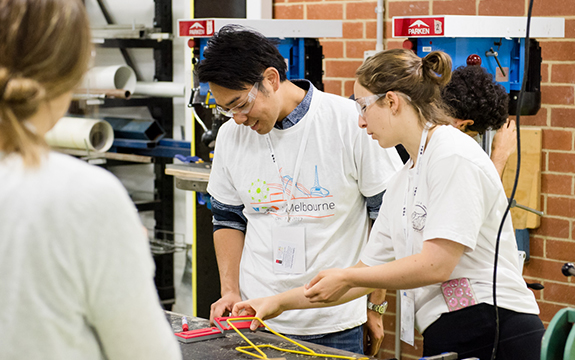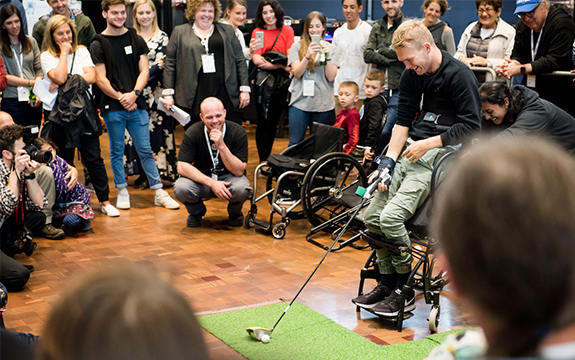Creative solutions improve lives of 12 Australians

In Summary
- Interdisciplinary teams create 11 prototypes for 12 Australians living with disabilities
- Open source designs to be made freely available online
Close to 150 engineers, designers, developers and health professionals joined forces at Swinburne University of Technology to help improve the lives of 12 Australians living with disabilities.
During three days of intense prototyping at the The Tikkun Olam Makers (TOM) Makeathon, teams of makers spent the first weekend of December developing creative and cost-effective solutions for people with disabilities.
Twenty-eight-year-old Beau Vernon, who was left a quadriplegic following a football injury, tasked his team with creating a golf club grip that would allow him to play nine holes of golf with his friends.
‘I have no finger movement, so the challenge was coming up with a grip that could support the golf club and not put too much strain on my wrist,’ he says.
The prototype created for Beau is an adapted glove that straps his wrist and holds the club in place using carefully designed brackets.

Creative problem solving
Other solutions created during the Makeathon include:
- A stabilising camera mount that allows stable filming ‘on the go’ while using crutches
- A fully adjustable seeing eye dog harness that means handlers can easily alter the length of the harness
- A custom-fitted hand strap and articulating armrest that enables someone with limited arm and hand control to paint or draw independently
- An adapted keyboard and mouse that allows the user to fully control the computer using only their feet
- A tracker that uses ultrasonic sensors or mechanical floats to measure how much liquid is left in a boiling pot, and then converts that information to audio feedback, to allow a vision impaired person to cook more accurately and safely
- Two customisable sensory play pods designed to engage and entertain young sisters who suffer from a rare condition called SYNGAP
- A multifaceted fishing solution that includes a motorised reel operated by a head point, a sensor which vibrates to alert when a fish is on the line, and a 3D printed rod mount for a wheelchair
- A machine-washable elasticised belt, with a ring and detachable clamp that grips onto a regular towel and makes it possible to dry yourself easily with one hand
- A universal bottle pourer that can be modified to suit individual needs such as muscle weakness, motor neuron disease, prosthetic limbs and other limited motor skills and dexterity
- A customised exercise solution for someone suffering from Prader-Willi Syndrome.
Prototype designs developed at Swinburne will be freely available to download online.
Positive change
Swinburne Deputy Vice-Chancellor (Research and Development) Professor Aleksandar Subic says the Makeathon is an incredible example of interdisciplinary teams coming together to create social impact.
‘It was humbling to see what can be achieved in such a short space of time when individuals work together with a common purpose.
‘Swinburne is dedicated to creating change through science, technology and innovation and we are proud to partner with an organisation such as TOM which shares in that vision.’

